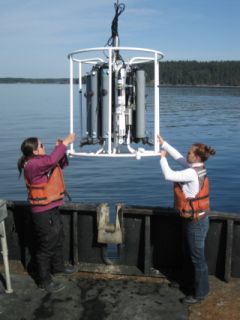Research Apprenticeship
Friday Harbor Laboratories, University of Washington
Research Apprenticeship

Autumn Quarter: Sept. 24 to Dec. 5, 2014 (10 weeks)
This research apprenticeship explores the habitats and organisms of the pelagic (open water) ecosystem of the San Juan Archipelago, where Friday Harbor Laboratories is located. In this complex and fascinating ecosystem, waters from oceanic realms and major river systems are mixed by a powerful tidal regime to create habitats for a diverse community of prey and predator species. Our goal is to understand how the various oceanographic processes shape these habitats and biological communities. Research apprentices investigate the patterns, interactions, and links among the many and varied components of this complex system.
Apprentices learn about oceanographic processes and the ecology of local marine flora and fauna. They also receive practical, hands-on instruction in the wide range of field and laboratory research techniques needed to study an entire ecosystem, conducting these procedures at sea on the UW-FHL research vessel and back on land in the FHL laboratory facilities. Apprentices then work with faculty to choose a particular focus for their own research. Previous apprentices have successfully studied a wide range of topics, including the influence of climate variation on water properties, effects of river and oceanic inputs on local water masses, oxygen and chlorophyll variation with depth and season, phytoplankton and zooplankton diversity, fish diets, and the effects of tides on seabird and marine mammal distribution. For most of the quarter, apprentices work together aboard the UW-FHL research vessel collecting samples and data for the on-going study and their individual projects, and then analyze their samples and data in the FHL laboratories. The lab experience is enhanced by periodic lectures from visiting scientists. Each apprentice’s independent research project culminates in a scientific research paper and oral presentation to the full FHL community. Teaching staff (two instructors, one TA) assist the apprentices in all facets of the research, including providing practice and feedback on oral presentations and assistance with writing a scientific paper.
Testimonials
The Pelagic Ecosystem Function (PEF) course solidified my enthusiasm for working in the marine environment making possible my current position as a marine naturalist in the Cayman Islands. it was a wonderfully experience and I will recommended to my friends in Europe who are studying Marine Biology.
Lune Vermeire, Pelagic Ecosystems Function 2010